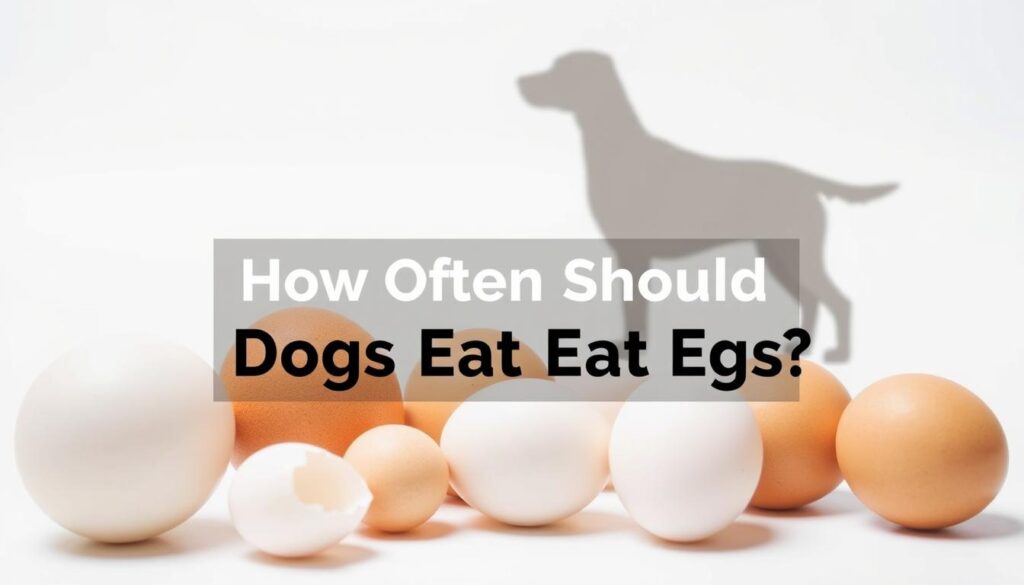As a devoted dog parent, you’ve probably wondered about expanding your furry friend’s dietary options. Eggs might seem like a simple food, but they pack a powerful nutritional punch for dogs. Understanding whether can dogs eat eggs is crucial for responsible pet nutrition.
Dog nutrition isn’t just about filling their bowl – it’s about providing balanced, healthy meals that support their overall wellness. Eggs can be an excellent addition to your dog’s diet when prepared correctly. They offer a rich source of essential nutrients that contribute to their health and vitality.
When considering pet food options, eggs stand out as a versatile and nutritious choice. They’re not just a tasty treat but a potential supplement to your dog’s regular diet. Eggs provide proteins, vitamins, and minerals that support their bodily functions.
Table of Contents
Key Takeaways
- Eggs are a nutrient-dense food for dogs
- Proper preparation is key to safe egg consumption
- Eggs should be part of a balanced diet
- Moderation is important to prevent weight gain
- Cooked eggs are safer than raw eggs
Understanding the Benefits of Eggs for Dogs
Eggs are a great source of nutrition for dogs. They offer many essential nutrients that help keep your pet healthy. Eggs can be a good addition to your dog’s diet if they are prepared right.
Essential Nutrients in Eggs
Eggs are packed with nutrients that are good for dogs. They have a lot of protein and other important nutrients. These nutrients can help your dog in many ways:
- Approximately 6 grams of protein per large egg
- Essential fatty acids for skin and coat health
- Vital vitamins including A, B12, and D
- Minerals such as iron, phosphorus, and selenium
Protein and Amino Acids
Eggs are a top-notch protein source for dogs. They help build muscles and repair tissues. Protein sources for dogs don’t get better than eggs, which have all the amino acids your dog needs.
“Eggs are nature’s multivitamin for dogs, offering a complete nutritional package in a simple, affordable form.”
Vitamins and Minerals
Eggs are not just about protein. They also have lots of vitamins and minerals. The egg yolk is especially good for biotin, a B vitamin that helps with growth. Selenium and zinc in eggs boost your dog’s immune system and overall health.
But remember, eggs should be given in moderation. Depending on your dog’s size, 1-3 eggs a week is safe. Always talk to your vet to find the best diet for your dog.
Can Dogs Eat Eggs?
Pet owners often wonder if eggs are safe for dogs. The good news is that dogs can eat eggs if they are prepared right. Eggs are full of nutrients that can help your dog’s diet.
Before adding eggs to your dog’s meals, remember these important points:
- Eggs are a great source of protein
- They have important vitamins and minerals
- It’s key to prepare eggs safely for dogs
Vets say eggs can be a good part of your dog’s diet. Boiled eggs are the safest and most nutritious choice. Small dogs should have only 1/4 to 1/2 an egg a day. Larger dogs can have up to one egg daily.
“Eggs are one of the best protein sources for dogs,” say veterinary nutritionists.
Some things to think about for egg safety for dogs include:
- Always cook eggs well
- Don’t add salt, pepper, or butter
- Be careful of allergic reactions
- Start with small amounts and watch for reactions
Remember, eggs are good but should be given in small amounts. Some breeds, like Labradors and Cocker Spaniels, might be more likely to have egg allergies. Always watch your dog after trying new foods. If you’re worried, talk to your vet.
Safety Considerations When Feeding Eggs to Dogs
When thinking about adding eggs to your dog’s diet, it’s important to weigh the risks and benefits. Eggs can be good for your dog, but you need to make sure they’re safe and healthy.
Potential Risks and Allergies
Every dog is different when it comes to eggs. Some dogs might have allergic reactions that need quick action. So, it’s key to introduce eggs slowly to avoid any health issues.
- Watch for signs of digestive distress
- Monitor your dog’s reaction after first consumption
- Consult with your veterinarian before significant dietary changes
Signs of Egg Allergies in Dogs
It’s important to know if your dog has an egg allergy. Common signs include:
- Vomiting
- Diarrhea
- Skin irritation or itching
- Respiratory difficulties
- Swelling around the face
“Prevention is always better than cure when introducing new foods to your dog’s diet.”
Proper Serving Sizes
The right amount of eggs for your dog depends on their size, breed, and health. Vets usually suggest:
- Small dogs: 1-2 eggs per week
- Medium dogs: 2-3 eggs per week
- Large dogs: 3-4 eggs per week
But remember, eggs should only make up 10% of your dog’s daily calories. Always focus on a balanced diet and get advice from a vet for your dog’s specific needs.
Different Ways to Prepare Eggs for Dogs
There are many ways to make eggs safe and tasty for dogs. Each method has its own benefits for your dog’s diet. The right way to cook eggs can turn them into nutritious treats.
Here are the top ways to prepare eggs for your dog:
- Boiled Eggs: The safest and most straightforward option. A large egg takes about 10-12 minutes to fully cook in boiling water.
- Scrambled Eggs: An excellent protein source without added ingredients. Avoid using butter or oil during preparation.
- Baked Eggs: Provides a unique texture that many dogs enjoy. Ensure no additional seasonings are used.
“Cooking eggs thoroughly eliminates potential bacterial risks and makes them a safe, nutritious treat for dogs.” – Veterinary Nutrition Experts
When preparing cooked eggs for dogs, remember these key guidelines:
- Always cook eggs completely to prevent bacterial infections
- Serve eggs in moderation – no more than 10% of daily caloric intake
- Remove eggshells unless specifically prepared for calcium supplementation
Pro tip: Cool boiled eggs in ice water for about 14 minutes to ensure safe handling and prevent burns. This method creates perfect, easy-to-serve healthy dog treats that most canines will love.
Raw Eggs vs. Cooked Eggs: What’s Better?
Feeding eggs to your dog can be tricky. It’s important to know the difference between raw and cooked eggs. The way you serve eggs can greatly affect your dog’s health and nutrition.
Risks of Raw Eggs for Dogs
Raw eggs can pose health risks for dogs. Pet owners need to be aware of these dangers. The main concerns are:
- Potential bacterial contamination from salmonella
- Risk of E. coli transmission
- Presence of avidin, which can interfere with biotin absorption
“Salmonella can cause serious health issues in dogs, including vomiting, diarrhea, and fever.” – Veterinary Health Experts
Benefits of Cooked Eggs for Dogs
Cooked eggs are safer and more nutritious for dogs. Cooking eggs kills harmful bacteria and makes nutrients easier to digest. Here are the main benefits:
- Improved digestibility
- Elimination of harmful bacteria
- Enhanced protein bioavailability
- Destruction of avidin, allowing better nutrient absorption
When preparing eggs for your dog, choose boiled or scrambled eggs. Make sure they don’t have salt, butter, or seasonings. Egg safety for dogs depends on how you prepare them. Vets suggest giving dogs 1-3 eggs a week, based on their size and diet.
How Often Should Dogs Eat Eggs?

When adding eggs to your dog’s diet, remember to keep it in moderation. Not every dog can eat eggs the same way. The right amount depends on your dog’s size, breed, and health.
Here are some general guidelines for feeding eggs to your furry friend:
- Very small dogs: Limit to 1 egg per week
- Larger breed dogs: Up to 3 eggs per week
- Puppies: Consult with your veterinarian for specific recommendations
“Eggs should be a supplement, not a staple in your pet food routine.”
Some dog breeds, like Labradors and Cocker Spaniels, might be more sensitive to new foods. Look out for signs of allergies like vomiting or diarrhea when adding eggs to their diet.
Boiled eggs are the safest choice. Raw eggs can have bacteria, so boiling is best. Always start with small amounts and watch how your dog reacts.
Eggs are packed with nutrients but shouldn’t be the main part of your dog’s diet. They offer great protein and vitamins. But, it’s best to give them as an occasional treat.
Eggshells: Are They Safe for Dogs?
Dog nutrition experts have long debated the role of eggshells in canine diets. Eggs can be good for dogs, but adding eggshells safely is key.
Eggshells are full of nutrients for dogs. They are a rich source of calcium. This can help your pet’s bones and overall health.
Nutritional Value of Eggshells
Eggshells have amazing nutritional benefits for dogs. Here are some key points:
- Approximately 1,800-2,000 milligrams of calcium per teaspoon of eggshell powder
- Natural source of minerals supporting canine health
- Contains trace amounts of essential minerals
Safe Ways to Serve Eggshells
When considering can dogs eat eggs with shells, follow these guidelines:
- Grind eggshells into a fine powder
- Sprinkle small amounts over your dog’s regular food
- Use no more than 1 teaspoon per 1,000 calories of diet
“Moderation is key when introducing eggshells to your dog’s diet.” – Veterinary Nutrition Experts
Always talk to your vet before adding eggshells to your dog’s diet. They are good, but must be part of a balanced diet.
Best Practices for Introducing Eggs to Your Dog’s Diet

Adding eggs to your dog’s diet can be a great choice. But, it’s important to do it right. This ensures your dog stays healthy and happy.
Here are the key steps to add eggs as treats:
- Start with a small amount – just one-quarter to half an egg
- Choose cooked eggs over raw to minimize potential risks
- Watch closely for any signs of digestive discomfort
- Gradually increase portion size if no adverse reactions occur
“Slow and steady wins the race when introducing new foods to your canine companion.”
Can dogs eat eggs safely? Yes, they can! A large egg has about 72 calories and lots of nutrients. But, remember, eggs should be given in moderation. Most vets say 1-2 eggs a week is okay for most dogs.
- Protein content: High (12.4 grams per 100 grams)
- Vitamins: Rich in D, E, A, and B12
- Minerals: Contains iron, phosphorus, and selenium
Always watch how your dog reacts to new foods. If they show signs like vomiting or skin issues, stop eggs and talk to your vet.
Signs Your Dog May Not Tolerate Eggs Well
Understanding egg safety for dogs is key. Dogs can have egg allergies, affecting about 4% of them. Knowing the signs of egg intolerance is important for your dog’s health.
Look out for these signs that your dog might not like eggs:
- Digestive Upset: Vomiting or diarrhea after eating eggs
- Skin Irritations: Excessive itching or unexpected rashes
- Respiratory Changes: Trouble breathing or odd coughing
- Behavioral Shifts: Sudden tiredness or loss of appetite
Egg white allergies are more common in dogs than yolk allergies. The protein Ovomucoid (Gal d 1) is the main allergen. It can cause quick immune reactions.
“Not all dogs react the same way to eggs. Individual sensitivity varies significantly.” – Veterinary Nutrition Research
Start with small amounts of eggs in your dog’s diet. Watch them closely for any bad reactions. If problems don’t go away or get worse, see your vet right away. This is to keep your dog healthy and happy.
Eggs as Part of a Balanced Dog Diet
Adding eggs to your dog’s diet needs careful thought. Eggs are great for protein, but they shouldn’t be the main food. Instead, see them as a way to boost their diet.
Dogs need a mix of foods to stay healthy. Eggs can be a good addition to their diet. Experts say adding eggs can make their food better.
“Eggs are nature’s nutrient powerhouse for canine health” – Veterinary Nutrition Expert
- Eggs provide high-quality protein sources for dogs
- Recommended as an occasional dietary supplement
- Best served cooked and in moderation
- Complement existing balanced pet food
Here’s how to add eggs to your dog’s diet:
- Start with small quantities
- Observe your dog’s reaction
- Consult with your veterinarian
- Ensure eggs are part of a balanced diet
Nutritional diversity is key to maintaining optimal canine health. Eggs add important nutrients, but they shouldn’t be the only thing in your dog’s diet.
Conclusion
When thinking about if dogs can eat eggs, pet owners need to be careful. Eggs are a healthy treat for dogs, full of proteins, vitamins, and minerals. They help keep dogs healthy. But, it’s important to prepare eggs right and not give too many.
Eggs are good for dogs, but every dog is different. Small dogs might only need a quarter egg a day. Big dogs can have one whole egg. Always check if your dog has any allergies and talk to your vet before adding eggs to their diet.
Cook eggs well and don’t add oils or spices. You can also give ground eggshells for extra calcium, but make sure they’re finely ground. Eggs should be a special treat, not a main meal, to keep your dog’s diet balanced.
Your dog’s health is the most important thing. Watch how they react to eggs and what they need to eat. Knowing how eggs fit into a dog’s diet helps you keep your pet happy and healthy.
FAQ
Are eggs safe for dogs to eat?
Yes, eggs are safe for dogs when cooked right. They’re a great treat that’s full of nutrients. Just remember to give them in small amounts.
How often can I feed eggs to my dog?
Vets say eggs are good as an occasional treat. Feed them 1-2 times a week. The right amount depends on your dog’s size.
Should I feed my dog raw or cooked eggs?
Always choose cooked eggs. Raw eggs might have Salmonella and can mess with biotin. Boiled or scrambled eggs are the safest choice.
Can eggs help improve my dog’s coat?
Yes, eggs are full of protein and fatty acids. They can make your dog’s coat shiny and strong. These nutrients help from the inside out.
What are the signs of an egg allergy in dogs?
Signs include vomiting, diarrhea, skin issues, itching, ear infections, or breathing problems. If your dog shows these signs after eating eggs, stop and talk to your vet.
Can I feed my dog eggshells?
Eggshells are a good source of calcium. But, they must be ground to avoid choking. Always check with your vet before adding them to your dog’s diet.
How should I introduce eggs to my dog’s diet?
Start with a small amount, like a teaspoon for small dogs and a tablespoon for big ones. Watch for any bad reactions. If your dog does well, you can give more.
Are there any dogs that shouldn’t eat eggs?
Dogs with health issues like pancreatitis or on special diets should avoid eggs. Always talk to your vet before adding new foods, especially if your dog has health problems.
How should eggs be prepared for dogs?
The best way is to boil or scramble them without salt, butter, or seasonings. Don’t use oil or add onions or garlic, as they’re bad for dogs.
What nutritional benefits do eggs provide for dogs?
Eggs are full of protein, fatty acids, vitamins A and B12, folate, selenium, and riboflavin. They help with muscle health, energy, and overall health when given in small amounts.
Source Links
- Can Dogs Eat Eggs? And Are Eggs Good for Dogs? – Total Vet – https://total.vet/can-dogs-eat-eggs/
- Can Dogs Eat Eggs Safely? Benefits And Risks – https://thenaturaldogstore.com/blogs/health/can-dogs-eat-eggs?srsltid=AfmBOoruR9B4CJtLL0lmNXJ1F7uDNYMSMdmi_gLk25ppiaWPh5b2lBK9
- Can dogs eat raw eggs – and should I add it to their food? – https://www.naturesmenu.co.uk/blog-can-dogs-eat-eggs.html
- Can Dogs Eat Eggs? The Truth About Eggs For Dogs – Dogs Naturally – https://www.dogsnaturallymagazine.com/feeding-your-dog-raw-eggs-good-or-bad/
- Can Dogs Eat Eggs Safely? Benefits And Risks – https://thenaturaldogstore.com/blogs/health/can-dogs-eat-eggs?srsltid=AfmBOop2mIcy2eyjP_59TZS2d50zH-p7HMQyZbJ3Tw5eHu1tBSUHgQ5i
- Can Dogs Eat Eggs? Here’s What Vets Say – https://www.rd.com/article/can-dogs-eat-eggs/
- Can Dogs Eat Eggs? – Misty Pines Pet Company – https://www.mistypinespetcompany.com/can-dogs-eat-eggs/
- Can Dogs Eat Eggs Safely? Benefits And Risks – https://thenaturaldogstore.com/blogs/health/can-dogs-eat-eggs?srsltid=AfmBOop8g-GYXax-cAljSUs6sqdF_X7jBsh4XPuazIVUx9CRhPYC9fPM
- How Many Eggs Can A Dog Eat In A Week? – Dogo – https://dogo.app/how-many-eggs-can-a-dog-eat-in-a-week/
- Emergency dog food: Safe foods for dogs to eat – https://bowwowinsurance.com.au/pet-community/pet-talk/foods-dogs-can-eat/
- How to Cook Eggs for Dogs: 3 Vet-Approved Recipes & Facts – Dogster – https://www.dogster.com/dog-nutrition/how-to-cook-eggs-for-dogs
- Can Dogs Eat Eggs? Why They Are a Dog Superfood – https://www.kinship.com/dog-nutrition/can-dogs-eat-eggs-super-foods-dogs
- Can Dogs Eat Eggs? – https://wagwalking.com/wellness/can-dogs-eat-eggs
- Can Dogs Eat Eggshells? The Safe Way to Add Calcium to Their Diet – https://thenaturaldogstore.com/blogs/health/can-dogs-eat-eggshells?srsltid=AfmBOop-ZuuMzFPnwKxlEdwgczvWRVVVCKHoH4O0aEamAAlM-0_b53yx
- Can Dogs Eat Quail Eggs? – https://pawsomerecipes.com/can-dogs-eat-quail-eggs/
- Can Dogs Eat Eggs Safely? Benefits And Risks – https://thenaturaldogstore.com/blogs/health/can-dogs-eat-eggs?srsltid=AfmBOop_LyBG08us3LBIjqypsR99Cb3lvSmZEXFfJnVa_scp1pDbEiEd
- Can Dogs Eat Eggs Safely? Benefits And Risks – https://thenaturaldogstore.com/blogs/health/can-dogs-eat-eggs?srsltid=AfmBOornYoQgP0_A1LHHpZCxZ9u8NXQgY4XfDGp7dkeGvdF13dGgbydm
- Can Dogs Eat Eggs? – PetLab Co – https://thepetlabco.com/learn/dog/nutrition/eggs-for-dogs?srsltid=AfmBOoqtuZxsav8p1cyxtzipdzSGKIZ_IebdBa7UeSbDEwZKedsEceOA
- Egg Allergy in Dogs: Symptoms, Diagnosis and Treatments – https://www.honestpaws.com/blogs/health/dog-allergy-egg
- Can Dogs Eat Eggs Safely? Benefits And Risks – https://thenaturaldogstore.com/blogs/health/can-dogs-eat-eggs?srsltid=AfmBOorodZmdaiMiHwHRfe374v4YsiXoL5TUXnJv94eJz8PaBlSSi_R8
- Dog Nutrition: Guide to Dog Food Nutrients – https://www.petmd.com/dog/nutrition/evr_dg_whats_in_a_balanced_dog_food
- Dogs and Eggs: What You Need to Know – CESAR® Malaysia – https://www.cesarmalaysia.com/dog-care/meal-time/can-dogs-eat-eggs
- Can Dogs Eat Raw Eggs? Vet-Reviewed Benefits, Risks & Safety – Dogster – https://www.dogster.com/dog-nutrition/can-dogs-eat-raw-eggs
- Are Egg Shells Good For Dogs? – Labradoodles & Dogs – https://labradoodlemix.com/are-egg-shells-good-for-dogs/




